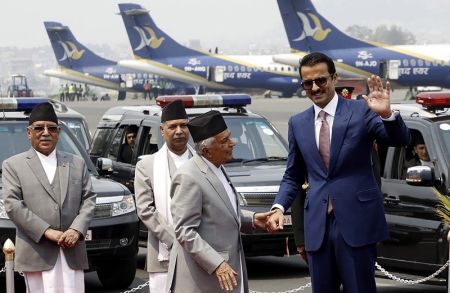(1).jpg) Mukesh Ambani Tops Forbes List of India's Richest Once Again
Mukesh Ambani Tops Forbes List of India's Richest Once Again With a networth of $21 billion, Mukesh Ambani has retained his title as India’s wealthiest for the sixth year in a row, while the country’s 100 richest persons saw their collective wealth grow by a modest 3 per cent in a year. NRI steel tycoon Lakshmi Mittal ($16 billion) also continues to hold the second position, while Sun Pharma’s Dilip Shanghvi has jumped to third place with a 50 per cent surge in his wealth to $13.9 billion, pushing IT czar Azim Premji to fourth place ($13.8 billion).
According to the US-based business magazine Forbes’ annual list of India’s 100 richest, released today, their total wealth grew by a modest 3 per cent from a year ago to $259 billion. “Growth in wealth was lacklustre due to India’s stumbling economy, which has been hit by inflation and a falling rupee,” Forbes said. Amid the sluggishness, Reliance Industries chief Mukesh Ambani and ArcelorMittal’s Lakshmi Mittal saw no change in their respective networths, but pharmaceutical industry titan Shanghi managed to buck the trend with a surge of $4.7 billion in his wealth to $13.9 billion. Premji’s wealth also rose by $1.6 billion, but he could not retain his third slot. Pallonji Mistry, patriarch of construction giant Shapoorji Pallonji Group, which is the biggest shareholder in Tata Sons, has moved down one place to fifth rank with a net worth of $12.5 billion. His younger son Cyrus Mistry last year succeeded Ratan Tata as new Tata group head.
NRI businessmen the Hinduja brothers have moved up to sixth place ($9 billion), from their ninth position last year. Shiv Nadar ($8.6 billion) has moved into the top-ten at seventh place, while Sunil Mittal has also returned to this league at 10th place ($6.6 billion). On the other hand, Essar group’s Ruia brothers and Jindal group’s Savitri Jindal have moved out from the group.
(1).jpg) American Trio Wins Noble Prize for Economics
American Trio Wins Noble Prize for Economics Groundbreaking research that reshaped the way economists and investors look at how markets work has earned three American professors the Nobel Prize in economics, the Royal Swedish Academy of Sciences announced Monday, 14th October. Eugene F. Fama and Lars Peter Hansen of the University of Chicago and Robert J. Shiller of Yale University received the prize "for their empirical analysis of asset prices," the Nobel committee said.
According to the committee, the economists' research "laid the foundation for the current understanding of asset prices." Their research showed that while it is difficult to predict asset prices in the short term, prices can be predicted in broad terms over longer periods, such as three to five years, according to the academy.
Their work resulted in the emergence of stock index funds -- collections of assets designed to mimic the results of broader stock indexes, such as the Dow Jones Industrial. Such funds are often staples of retirement and individual investment accounts. Shiller warned about the 1990s-era "stock bubble" and about high home prices before the decline in housing values that greatly contributed to the recession from which the U.S. economy continues to recover.
Reached by phone during the news conference announcing the award, Shiller said "disbelief" was the only way to describe his reaction. "A lot of people have told me they hoped I would win it, but I am aware that there are so many other worthy people that I had discounted it," he said. He said economics has broad applications to improving human welfare. "Finance drives modern civilization," Shiller said. "I want to see finance developed further to benefit mankind." The economics award was not among the original prizes created in 1895 by Swedish industrialist Alfred Nobel to honor work in physics, medicine, chemistry, literature and peace. The Central Bank of Sweden added it as a category in memory of the industrialist. The first prize was awarded in 1969. Most of the recipients of the Nobel in economics have been born in the United States.
UK Economy Accelerates to Fastest Growth Since 2010
Britain's economy grew at the fastest rate for more than three years during the third quarter, official data showed on 25th October Friday, as the country's recovery gathers speed. Gross domestic product -- the total value of goods and services produced in the economy -- rose by 0.8 percent in the July-September period. That compared with GDP growth of 0.7 percent in the second quarter, the Office for National Statistics said in a statement.
This was the strongest growth since the second quarter of 2010 when the economy grew by 1.0 percent, before contracting. The recovery to Britain's economy is broad-based, the ONS said on Friday, adding that GDP expanded by 1.5 percent in the third quarter (Q3) compared with output in the equivalent period in 2012.
"Output increased in all four main industrial groupings within the economy in Q3 2013 compared with Q2 2013," the ONS said as it gave its initial estimates for the third quarter. "Output increased by 1.4 percent in agriculture, 0.5 percent in production, 2.5 percent in construction, and 0.7 percent in services. Output from services is now slightly above its previous peak in Q1 2008, prior to the economic downturn," the ONS added.
.jpg)
(1).jpg) Singapore, Hong Kong Best for Business: World Bank
Singapore, Hong Kong Best for Business: World Bank Singapore and Hong Kong rank the world's best places to run a business, while mainland China remains far down the list, according to the World Bank's annual competitiveness survey published on 29th October, Tuesday, The Southeast Asian entrepots and finance centers topped the survey for the eighth straight year, with New Zealand, the United States and Denmark rounding out the top five, as a year ago.
The lower ranks of the 189-country list were populated with African countries like Chad, the Central African Republic and Libya holding. But a rising African country, Rwanda, took honors as the most improved since 2005, praised for its efforts to boost property registration and for simplifying trading and tax procedures. China, which was furious to receive a ranking of 91 last year and has pressured the World Bank to drop the 11-year-old study, fell five notches this year to 96th place and was leapfrogged by Russia.
The "Doing Business 2014" report said many countries are making it easier for people to start and run a local business, with low-income economies moving more quickly than larger ones to improve. "Regulation is a reality from the beginning of a firm's life to the end," the report says. "Navigating it can be complex and costly." But in many areas, it added, "there has been remarkable progress in removing some of the biggest bureaucratic obstacles to private sector activity." The rankings focus on what a small or medium-sized business faces in its home country, as opposed to how a multinational giant would fare in the same environment.
The data was based on surveys of more than 10,000 professionals, mostly people who routinely help administer or give advice on legal and regulatory issues in a country. The countries are scored on a range of issues, from how many days and procedures does it take to start a business, to the length of time to get a power hookup, to the ease of credit and the cost of exporting or importing a container. Countries credited with progressing the most in the past five years include Rwanda (ranked 32), Russia (92), Ukraine (112) and the Philippines (108). Russia and Rwanda both jumped 20 places from last year, Ukraine gained 25 and the Philippines 30 places. China is likely to remain unhappy with its rating. It scored particularly poorly on the challenges of starting a business, dealing with construction permits, making tax payments and protecting investors. Even in trade, the mainstay of the world's second largest economy, it ranked only 74 on the list. Last year China pressed the new World Bank President Jim Yong Kim to scrap the survey. Bin Han, China's alternate director at the bank, said then that the report "used wrong methodologies, failed to reflect facts (and) misled readers."
Toyota Keeps Top Spot in Auto Sales Ranking
(1).jpg)
Toyota Motor Corp kept its lead over rivals General Motors Co andVolkswagen AG this year, January-September global sales figures showed, as the Japanese carmaker closes in on a record annual profit.
Toyota's groupwide sales totalled around 7.412 million vehicles, up 0.1 per cent from the same period a year ago, the company said on 28th October , Monday, as strong sales in the United States offset slowdowns in Thailand and China. Toyota's groupwide total includes sales at affiliates Daihatsu Motor Co Ltd and Hino Motors Ltd. General Motors sold 7.25 million vehicles during the same January to September period, up 4.6 per cent year-on-year, while Volkswagen rose 4.8 per cent to 7.03 million vehicles, according to figures released earlier this month. Volkswagen's sales figure however, excludes its Scania and MAN brands. Scania sold around 56,220 vehicles up to September. Scania and MAN brands typically account for a combined 200,000 vehicles in a full year. Toyota regained the global sales crown in 2012 after slipping to third place behind GM and Volkswagen in 2011, following natural disasters in Japan and Thailand. Previously, it had been on top from 2008 through 2010.
Analysts expect Toyota to post 2.4 trillion yen ($24.7 billion) in operating profit for the year ending March 2014, more than the record 2.27 trillion yen it hit in the year ended March 2008, as the weaker yen makes exports profitable. For the full year, Toyota, together with Daihatsu and Hino, expects to sell 9.96 million vehicles, up 2 per cent from 2012. Toyota, which will announce its July-September results on Nov. 6, is expected to post an operating profit of 616.5 billion yen, nearly double what it posted a year ago.
US Tax probe Leaves Swiss Bankers Afraid to Travel: Report
.jpg)
As a United States hunt for tax evaders and their accomplices gains momentum, many Swiss bankers are afraid to go abroad for fear of arrest, one business leader said in an interview published Sunday, 27th October. "In my opinion, some 1,000 Swiss bankers no longer dare to go to the United States, or even travel abroad," Martin Naville, the head of the Swiss-American Chamber of Commerce, was quoted as saying by Le Matin Dimanche weekly.
Swiss banks and industry representatives are increasingly cautioning bankers who have worked with US clients to refrain from travelling outside Switzerland, the paper reported. Swiss banks are believed to have accepted tens of billions of undeclared dollars from US citizens, though they now refuse such money, and a number of banks are under US investigation. The US has not made public which individual bankers it is probing, but according to Le Matin Dimanche, about 30 names are on the list.
Recently however, "the United States has proven it can strike where and when it likes, and now with the help of European countries", the paper wrote, describing widespread paranoia throughout the banking industry. The report comes just over a week after the arrest in Italy of a former high-ranking UBSexecutive alleged to have helped US customers conceal their assets.
Raoul Weil, the 54-year-old ex-chairman of UBS's global wealth management service, was indicted by a US federal grand jury in 2008 for his alleged role in overseeing the US cross-border business. The indictment alleges that Weil and co-conspirators helped US customers hide around $20 billion (15 billion euros) in assets from tax authorities. The Swiss national, who left UBS after the 2008 indictment, has always denied the charges and is reportedly fighting his extradition from Italy to the US. The Swiss Bank Employees Association told Le Matin Dimanche it was advising all bankers who have regularly visited clients in the US "to abstain from travelling". And some Geneva banks are urging employees living on the French side of the border to settle in Switzerland instead to avoid problems, one banker who wished to remain anonymous told the paper. "I don't even dare leave Zurich anymore," said another unnamed banker, who recently found out his name had been handed to US authorities.
World Currency Turbulence Hits Company Earnings
.jpg)
Emerging markets have helped rake in a corporate earnings bonanza in recent years, but a sudden plunge in their currencies in mid-2013 due to an expected cut in US stimulus has sorely hit sales and profit. Quarterly results at companies from Coca-Cola to IBM, Unilever to Casino and luxury group LVMH show that currency volatility has hit the bottom line. "The 'emerging risk' is a source of concern in the first release of third quarter results," economists at broker Aurel BGC said.
The Brazilian real, South African rand, Turkish lira, Indian rupee and Indonesian rupiah lost up to a fifth of their value in August as investors pulled out funds in anticipation the US Federal Reserve would soon begin to taper the amount of monetary stimulus it injects into the economy. "Across the range of firms missing revenue targets for the third quarter, one factor increasingly blamed is the impact of a higher euro," said CMC Markets trader Toby Morris. "...Firms with an active client base in emerging economies are hit the hardest, with weaker currencies magnified in South America and India," he added in a note to clients.
The euro has not only risen sharply against emerging market currencies, it has also reached its highest levels since 2011 against the dollar due to disappointing economic data from the United States and the prospect of more monetary stimulus. French electrical equipment group Schneider Electric warned the euro was over-valued and was hurting business. "It's painfully evident that the eurozone is the only major economic zone that doesn't use its currency as an economic weapon and a weapon of competitiveness," Finance Director Emmanuel Babeau told AFP. The Paris-based company, a world leader in electrical engineering said that currencies had depreciated sharply in markets where the company can make as much as a billion euros in sales. "We find ourselves overvalued in relation to many currencies, including the dollar, that's very clear," he said.





















